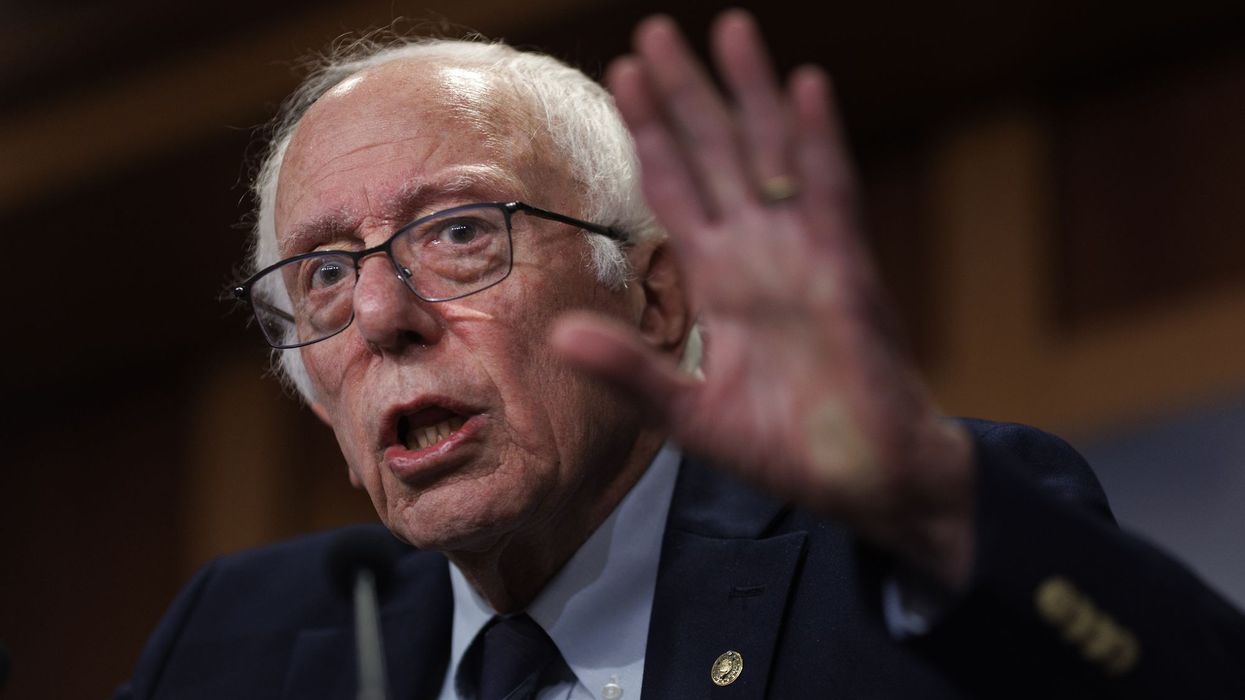‘No More Military Aid for Netanyahu,’ Says Sanders as Israel Ramps Up West Bank Takeover
"It’s not just Gaza," the senator said. "Netanyahu’s extremist government is supporting the violent annexation of Palestinian land in the West Bank."
As Israeli settlers escalate attacks on Palestinians in the West Bank as part of a furious state-backed annexation push, US Sen. Bernie Sanders said it was yet another reason to suspend military aid to the government of Prime Minister Benjamin Netanyahu.
"It’s not just Gaza," the independent Vermont senator wrote on social media Sunday. "Netanyahu’s extremist government is supporting the violent annexation of Palestinian land in the West Bank. This is illegal and immoral, and decades of American silence have enabled it."
"NO MORE MILITARY AID FOR NETANYAHU," he concluded.
Sanders was responding to a feature published in the New York Times that same day, which examined the rapid expansion of illegal settler outposts over the past two decades, and the further acceleration after October 7, 2023, when Israel’s more than two-year genocidal assault began in Gaza following a Hamas-led attack.
The report provides data from the Israeli activist group Peace Now, which found that in 2024 and 2025, Israelis built more than 130 new outposts in the West Bank.
Despite the fact that they are illegal under both Israeli and international law, the settlers constructing these outposts operate with the support of the Israeli military and government.
As the Times reports:
The unrelenting violent campaign by these settlers, that critics say is largely tolerated by the Israeli military, consists of brutal harassment, beatings, even killings, as well as high-impact roadblocks and village closures. These are coupled with a drastic increase in land seizures by the state and the demolition of villages to force Palestinians to abandon their land.
Many of the settlers are young extremists whose views go beyond even the far-right ideology of the government. They are not generally operating on direct orders from Israel’s military leadership. But they know the military frequently looks the other way and facilitates their actions.
In many cases, it is the military that forces Palestinians to evacuate or orders the destruction of their homes once settlers drive them to flee.
Just in 2025, the report says, settlers and the military have razed more than 1,500 Palestinian structures, double the annual average from before 2023. Since the war began, more than 4,000 Palestinians have been forcibly displaced from their homes.
Meanwhile, the Israeli government has also declared a record number of areas in the West Bank to be "state land," meaning that they are off limits to Palestinians and that Israelis can use them to build more settlements.
Far-right forces in the Israeli government have been overt about the intention of these settlements: to carve up the West Bank so thoroughly that a contiguous Palestinian state becomes effectively impossible. Netanyahu has often reiterated his position that under his watch, a Palestinian state will never be created.
In August, as the Israeli government approved a massive 3,400-home settlement project in the heart of the occupied West Bank, Finance Minister Bezalel Smotrich—himself a settler and one of the leading representatives of the far-right settler movement in Netanyahu’s cabinet—boasted that the project “buries the idea of a Palestinian state,” adding that “Every town, every neighborhood, every housing unit... is another nail in the coffin of this dangerous idea.”
On Sunday, Israel’s cabinet approved another 19 Jewish-only settlements across the West Bank, raising the total number to more than 200 in the territory, up from around 140 three years ago. Smotrich said with the new construction, Israel was “putting the brakes on the rise of a Palestinian terror state.”Until recently, the official policy of the US government has been one of opposition to settlements, even as their construction continued largely unimpeded.
During his second term, President Donald Trump has talked out of both sides of his mouth. While promising Arab leaders that Israel would not annex the West Bank as he sought to broker a ceasefire, his administration has often expressed tacit, and occasionally overt, support for settlement expansion.
UN Secretary-General António Guterres denounced the rapid expansion of settlements, saying it “continues to fuel tensions, impede access by Palestinians to their land, and threaten the viability of a fully independent, democratic, contiguous, and sovereign Palestinian state.”
In July, as reports of famine out of Gaza grew increasingly dire due to Israel's blockade of humanitarian aid, Sanders sponsored a Senate resolution to block $675 million in US weapons sales to Israel.
Though the vote was far from passing, 27 members of the Democratic caucus—a majority, for the first time—voted in favor. Sanders said it suggested that "the tide is turning" with respect to attitudes towards Israel's actions within the party.
In an AtlasIntel poll published on Friday, 62% of respondents said they opposed US financial support for Israel, compared with 20% who supported it. 50% of respondents said they "totally oppose" weapons to Israel, while just 9% said they "totally support" it.
Despite this, the most recent military spending bill, passed last week, provides another $650 million in military aid for Israel, up $45 million from the previous package, despite the implementation of a ceasefire in Gaza.
The bill also included an unprecedented measure requiring the executive branch to assess how the US can supply additional weapons to Israel to fill in "gaps" from embargoes imposed by other nations over the country's human rights abuses in Gaza and the West Bank.


